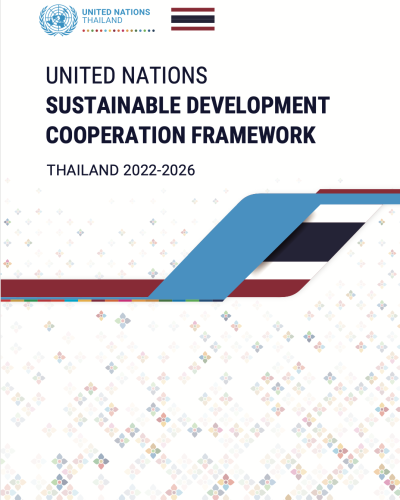United Nations Sustainable Development Cooperation Framework (UNSDCF) 2022–2026

The United Nations Sustainable Development Cooperation Framework 2022-2026 (UNSDCF) articulates the UN development system’s support for Thailand’s strong commitment to achieve the 2030 Agenda for Sustainable Development and the Sustainable Development Goals (SDGs), and its ambition to become a high-income, inclusive, sustainable, resilient and advanced nation.
In the preparation of the UNSDCF, the UN, Ministry of Foreign Affairs (MFA) and Office of the National Economic and Social Development Council (NESDC) have led an extensive stakeholder consultation process. The overarching objective of the consultations was to ensure that diverse stakeholders had the opportunity to inform the discussion on Cooperation Framework priorities, outcomes and focus areas, with a specific emphasis on the UN’s contribution and value add in supporting the government to advance the SDGs while leaving no one behind.
Three strategic outcomes for the UNSDCF emerged, founded on the UN principles including ‘Leave No One Behind’, human rights, gender equality, sustainability and resilience. These three outcomes align with Thailand’s 20-year National Strategy and contribute to 12 of the Government’s 13 milestones contained in the draft 13th National Economic and Social Development Plan (NESDP). The three strategic outcomes are underpinned by six focus areas in which UN agencies will collaborate with the Government and development partners to support the country achieve specific results that contribute to the SDGs, where the UN is best placed to leverage its comparative advantages. The first outcome will contribute to two NESDP strategic priorities dealing with ‘Targeted Manufacturing and Service Sector’s and ‘Natural Resources and Environmental Sustainability’. The second outcome will contribute to the NESDP strategic priority dealing with ‘Key Enablers for Thailand’s Transformation’. The third outcome will contribute to the NESDP strategic priority dealing with ‘Socio-Economic Opportunity and Equity’.
In summary, for Thailand to advance into higher value-added sectors based on low carbon, environmentally sustainable and inclusive growth requires a bold policy shift, accompanied by a significant change in policy implementation. A major increase in public and private investment is needed in Industry 4.0 enablers, including digitization, innovation and associated technologies (automation, AI, the internet of things, fintech, blockchain, etc.) to increase productivity and transformation across the NESDP prioritized sectors. This must be accompanied by increased investment in quality human capital via equitable education, skills and labour market development, universal healthcare services, and adequate social welfare provision.
The UN will support Thailand in the fulfilment of its vision for transformative high-value economic, human and sustainable development by drawing on its global reach and capabilities. The UN is at the forefront of the 2030 Agenda for Sustainable Development and is uniquely placed to support the Government to leverage opportunities arising from development inspired by human rights-based treaties and conventions to which the country is party, and to promote inclusive social and economic development through the transfer of technical knowledge and adaptation of scalable development solutions. The UN can be depended upon as a provider of cutting-edge integrated policy support and technical assistance to build forward sustainably with a focus on enhancing productivity and balancing environmental impacts.





















